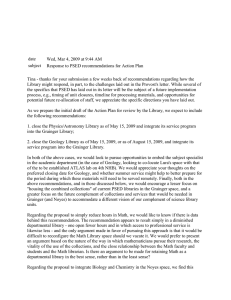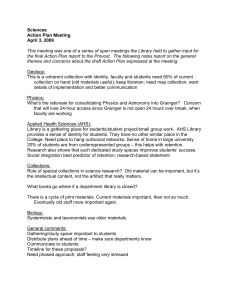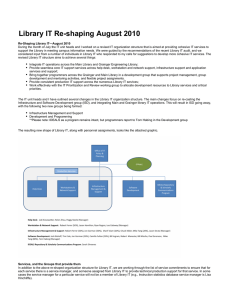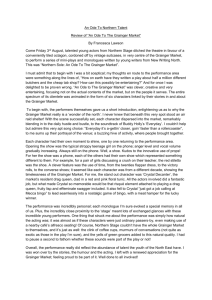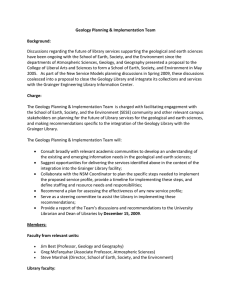January 30, 2009 Paula Kaufman Dean and University Librarian
advertisement
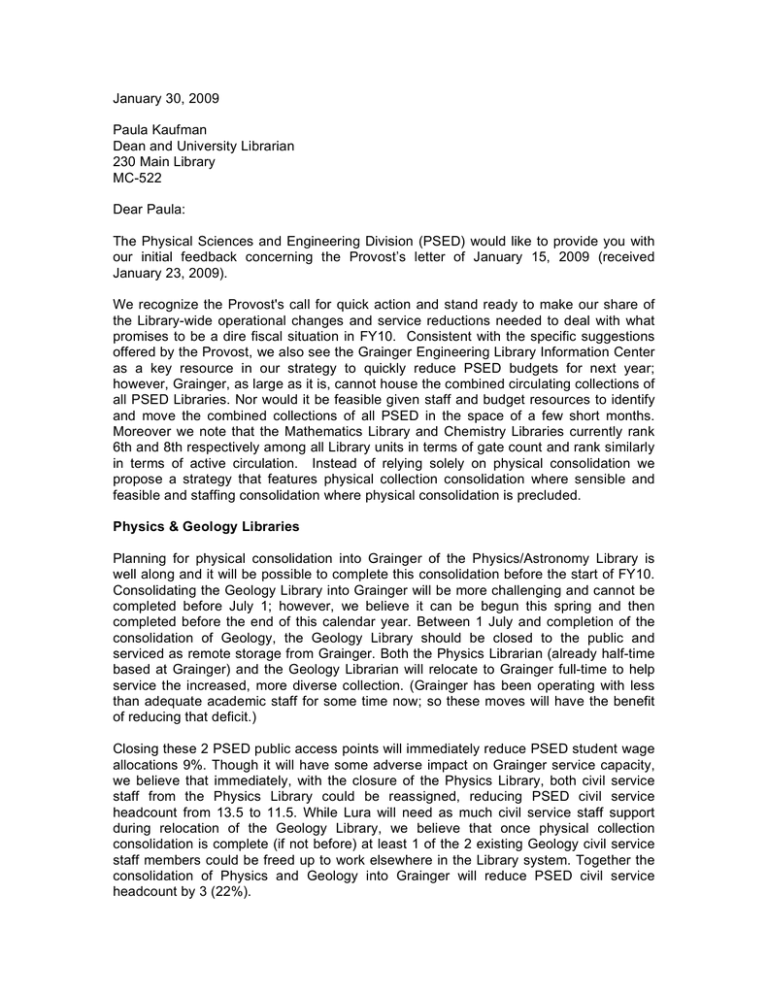
January 30, 2009 Paula Kaufman Dean and University Librarian 230 Main Library MC-522 Dear Paula: The Physical Sciences and Engineering Division (PSED) would like to provide you with our initial feedback concerning the Provost’s letter of January 15, 2009 (received January 23, 2009). We recognize the Provost's call for quick action and stand ready to make our share of the Library-wide operational changes and service reductions needed to deal with what promises to be a dire fiscal situation in FY10. Consistent with the specific suggestions offered by the Provost, we also see the Grainger Engineering Library Information Center as a key resource in our strategy to quickly reduce PSED budgets for next year; however, Grainger, as large as it is, cannot house the combined circulating collections of all PSED Libraries. Nor would it be feasible given staff and budget resources to identify and move the combined collections of all PSED in the space of a few short months. Moreover we note that the Mathematics Library and Chemistry Libraries currently rank 6th and 8th respectively among all Library units in terms of gate count and rank similarly in terms of active circulation. Instead of relying solely on physical consolidation we propose a strategy that features physical collection consolidation where sensible and feasible and staffing consolidation where physical consolidation is precluded. Physics & Geology Libraries Planning for physical consolidation into Grainger of the Physics/Astronomy Library is well along and it will be possible to complete this consolidation before the start of FY10. Consolidating the Geology Library into Grainger will be more challenging and cannot be completed before July 1; however, we believe it can be begun this spring and then completed before the end of this calendar year. Between 1 July and completion of the consolidation of Geology, the Geology Library should be closed to the public and serviced as remote storage from Grainger. Both the Physics Librarian (already half-time based at Grainger) and the Geology Librarian will relocate to Grainger full-time to help service the increased, more diverse collection. (Grainger has been operating with less than adequate academic staff for some time now; so these moves will have the benefit of reducing that deficit.) Closing these 2 PSED public access points will immediately reduce PSED student wage allocations 9%. Though it will have some adverse impact on Grainger service capacity, we believe that immediately, with the closure of the Physics Library, both civil service staff from the Physics Library could be reassigned, reducing PSED civil service headcount from 13.5 to 11.5. While Lura will need as much civil service staff support during relocation of the Geology Library, we believe that once physical collection consolidation is complete (if not before) at least 1 of the 2 existing Geology civil service staff members could be freed up to work elsewhere in the Library system. Together the consolidation of Physics and Geology into Grainger will reduce PSED civil service headcount by 3 (22%). Mathematics Library While it is not feasible to relocate the 100,000+ volumes in the Mathematics Library to Grainger, and while as noted by the Mathematics Department reconfiguration of Library space in Altgeld Hall would be extremely expensive and forbidden by law until a waiver could be negotiated (given Altgeld's Historical Registry status), we do believe that savings could be realized by servicing the collection more from Grainger in the future. We propose that the Mathematics Library reduce open hours to 10 AM - 6 PM M-F and 2 PM - 5 PM Sunday (a net reduction of 16 open hours), being staffed during those hours by a single civil service staff member supported by 10 hours of GA time (current FY10 GA allocation to Math) and a reduced number of undergraduate student assistant hours. The Mathematics Librarian (Tim Cole) will reduce LOE dedicated to the Math Collection to 0.5 FTE and be available to work elsewhere -- e.g., on digital projects at Grainger or the Main Library, or to address some other even more critical need should that arise. The reduction in open hours at Math and staffing changes described above would immediately net a savings of 25% of the Math Library's student assistant wage budget and free up 0.5 FTE of academic staff. By migrating some servicing of the Math collection to Grainger, the second civil service staff member currently assigned to the Math Library would also become available for reassignment. Since Grainger will now be taking on service of the Physics/Astronomy collection, the Geology collection, and a larger role in servicing the Mathematics collection, our preference would be to reassign this civil service staff member to Grainger; however, if Library-wide civil service cuts are predicted to exceed 22%, then potentially this individual could be re-assigned elsewhere in the Library system. Chemistry Library Given the Chemistry Library's high use rate, its strategic location close to the Biology Department, and honoring the large recent investment of the School of Chemical Sciences in the Chemistry Library physical space, we propose that the Chemistry Library take on a portion of the Biology Library collection, namely molecular and cellular biology (MCB), which fits well with the biochemistry collection. (This assumes that the rest of the Biology Library collection will be consolidated into ACES.) In addition, the Chemistry Library, maintaining the same 1.5 FTE staff, would absorb all MCB reserves and would serve as library space in that region of campus, offering all students in that area a pickup location and a place to study. Adding MCB’s reserves to the Chemistry Library represents an approximately 20% increase in library reserves at this location for the same staff cost. Conclusion We believe the three remaining PSED units will continue to perform above the norm in cost effectiveness and efficiency. In the best interest of the Library, we propose to hold these units, and all library units, to regular reviews and performance measurements. We understand that both services and collections will change dramatically in the coming years. This proposed three-library, five-discipline make-up of PSED is suggested as an interim model as we move towards a still-unclear future, but understandably a future that might require a different set of libraries, services, and collections. We plan to be ready. These serious reductions and the agreement to take on more responsibilities in our remaining units add up to considerable cost cutting and sharing. We believe these proposed reductions in services and locations will meet or exceed the Library’s target percentages. We believe our constituency understand and will accept the need for these changes, although those contacted so far have expressed predictable concerns for impacts on research and pedagogy; however, several have also perceived a bias against science libraries in the text of the Provost's letter. We don't believe any such bias was meant, but we wanted to make you aware of this perception. More drastic cuts beyond those outlined above will signal to some a disproportionate cutting in libraries outside the main library as well as among science disciplines. We are available to meet to discuss this proposal at your convenience. Sincerely, Tina Chrzastowski Tim Cole Lura Joseph Bill Mischo Mary Schlembach
